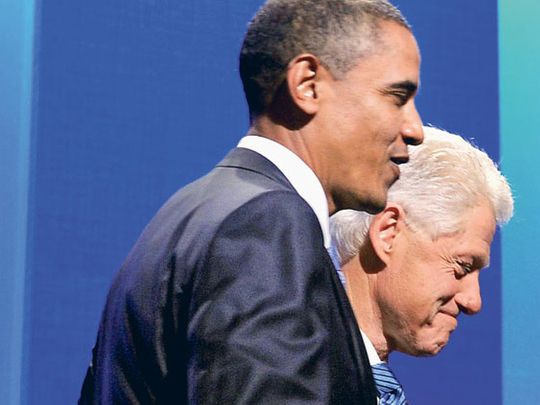
New York: President Barack Obama challenged a pessimistic world to overcome decades of shattered promises and help Israelis and Palestinians close a historic deal within a year.
"This time will be different," he declared, offering a now-or-never choice between Mideast stability and perpetual bloodshed.
To a hushed audience of global leaders, Obama made Mideast peace the dominant theme of his yearly address Thursday to the UN General Assembly, a sign of the fragile state of the latest talks and the importance he attaches to their success.
Nearly every other topic of his international agenda was shoved to the margins, save for a vigorous call for support of human rights.
In a message to allies and foes alike, Obama devoted the final passage of his speech to a need for people to live freely, and he warned that "we will call out those who suppress ideas." While he spoke of tyranny by the Taliban and in North Korea, he did not single out allies that the US has accused of repressing their people, such as Russia and China.
Empty talk
With fresh Mideast peace talks seemingly on the brink of collapse, Obama took on sceptics directly. He challenged Israelis and Palestinians to make compromises, exhorted supporters on both sides to show real backing instead of empty talk and painted a grim picture of what will happen if the current effort is consigned to the long list of failed attempts.
"If an agreement is not reached, Palestinians will never know the pride and dignity that comes with their own state," Obama said. "Israelis will never know the certainty and security that comes with sovereign and stable neighbours. ... More blood will be shed. This Holy Land will remain a symbol of our differences instead of our common humanity."
The speech came amid a wider burst of presidential diplomacy in New York. Obama met at length with Chinese Premier Wen Jiabao over US contentions that China's currency is undervalued, but he emerged with little evident progress.
UN Secretary-General Ban Ki-moon set the tone for the meetings when he implored leaders to show more respect to each other and bring the world together. He warned of a "politics of polarization" — a term that on a different level also could fit the situation in the US.
Twenty months in office, Obama no longer made a point of breaking away from George W. Bush and embracing the multilateral approach of the United Nations, as he did in his first address last year before this world gathering.
The record of the White House is now his to defend. He did so repeatedly, particularly US efforts to avoid a global economic catastrophe.
The commander in chief for two wars, Obama made spare mention of either one. He reminded the world that he was winding down the divisive conflict in Iraq and accelerating the fight against extremists in Afghanistan. Yet there was not a major emphasis on terrorism or religious tolerance.
Iran threat
On the pressing security threat of Iran, Obama again extended a diplomatic hand. But he insisted the government there must prove to the world that its nuclear pursuits are for peaceful energy, not weaponry, or it will face further consequences.
Iran recently has indicated interest in restarting talks with the West, and on Wednesday the five permanent members of the UN Security Council and Germany offered another chance to enter negotiations. Iranian state TV quoted Foreign Minister Manouchehr Mottaki, who was in New York, as saying Iran was ready to resume the talks but the negotiations must be fair.
Mahmoud Ahmadinejad addressed an afternoon session of the assembly. At one point he said that some have speculated that Americans were actually behind the September 11, 2001 terror attacks and that they were staged in an attempt to assure Israel's survival. At that, the US delegation walked out.
The search for Mideast peace always tests the limits of US presidential power, and this time is no different.












